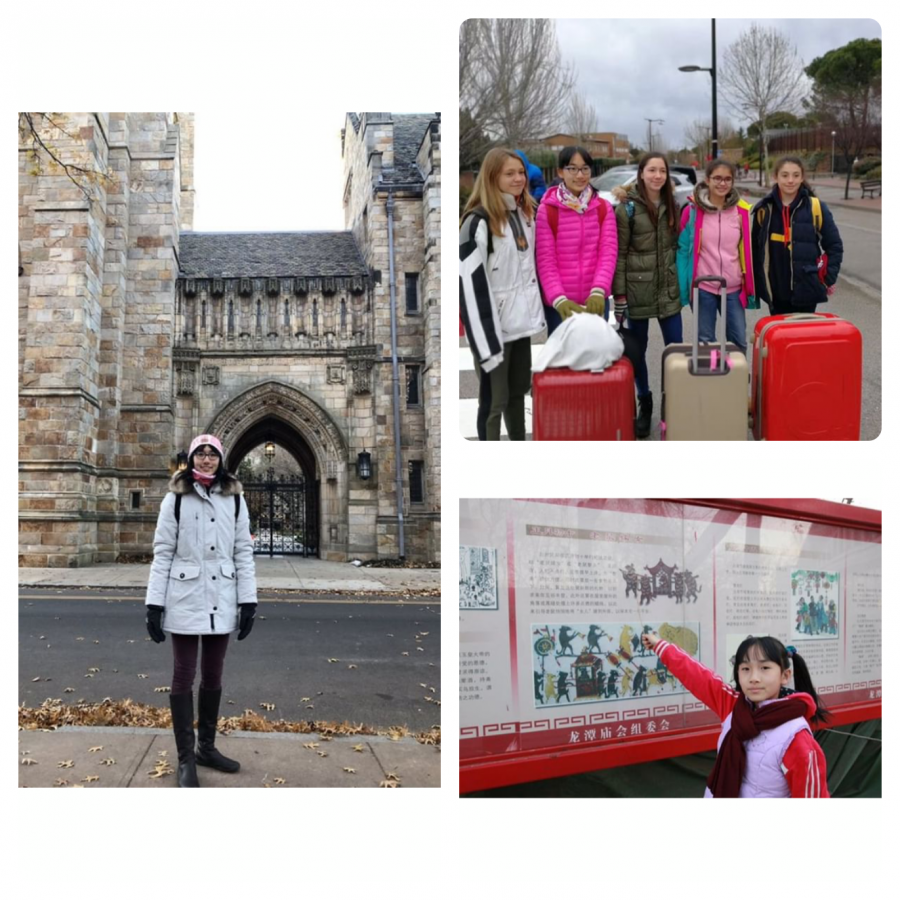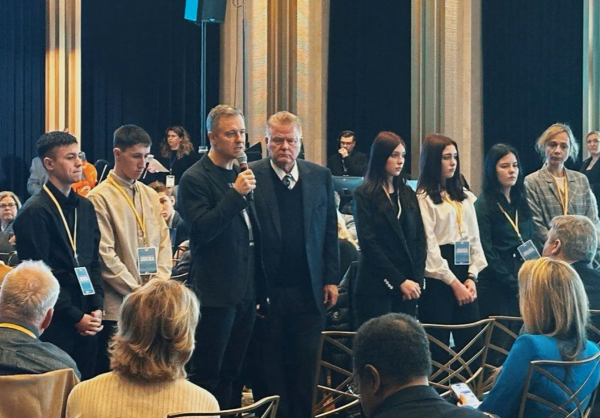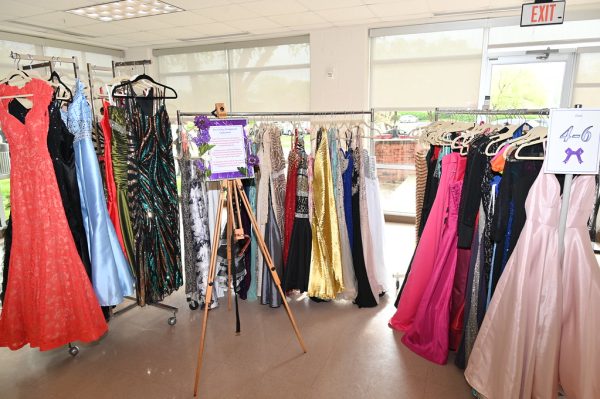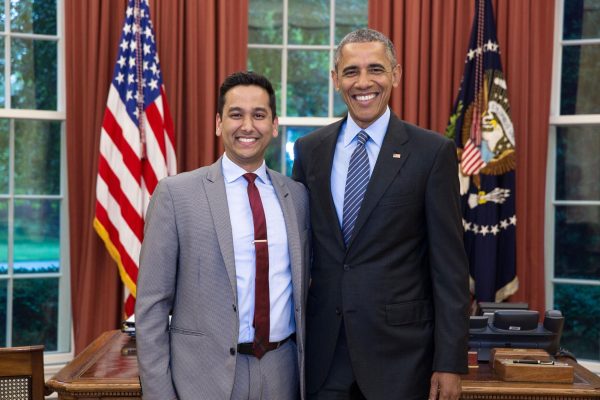Travelers move across the continental, cultural divide
Betty Zhu has lived in three countries, two continents, and different hemispheres. Zhu’s dad is a diplomat. In the left photo, Zhu stands in Boston where she admires the architecture. In the top right photo, Zhu is surrounded by her friends in Spain before they go on a ski trip. On the bottom right photo, Zhu points to a sign that showcases some local history in China. Photo courtesy of Zhu.
When junior Linn Dragsted moved from an apartment in the city of Copenhagen to a barb-wired compound in Nigeria, she was restless. She wasn’t allowed to go outside of the compound. Soon, however, she found a new source of entertainment to pass the time: she played continual pick-up games of soccer with the few other kids that were in the compound until her mom called her back or the sky turned pink. Now, as she rows on the Potomac river every day as a part of the Whitman crew team, she remembers her time in Nigeria and calls it the place where she found her athleticism.
Many Whitman parents have jobs that require their families to move every couple years to different countries—often with diplomatic institutions or with international organizat
ions like the World Bank. With each change in location, students are exposed to new lifestyles, cultures, foods and trends, and they’re faced with the struggle of grasping the balance between maintaining their own identities while adjusting to their surroundings.
Dragsted’s father works in the World Bank, which places her at a different branch around the world every few years. Moving frequently has allowed Dragsted to observe different cultures up close. When she was in Nigeria, the intense religious aspect of the culture sparked her family’s interest in religions of the world; in fact, her dad started reading the Quran—a religious text of Islam.
“I think moving to other countries gave me a sense of what the world is like and made me a world citizen,” Dragsted said. “It made me more open to talking to people who weren’t like myself and helped me connect with people who are like myself and have moved a lot. [Moving] gives you such great life skills, and it gets you to be yourself no matter where you are.”
Sophomore Betty Zhu finds each move to be “a new beginning.” Zhu’s father is a Chinese diplomat. Her family lived in China for the first ten years of her life and moved to Spain in February of 2014; they then moved to the U.S. in March of 2018.
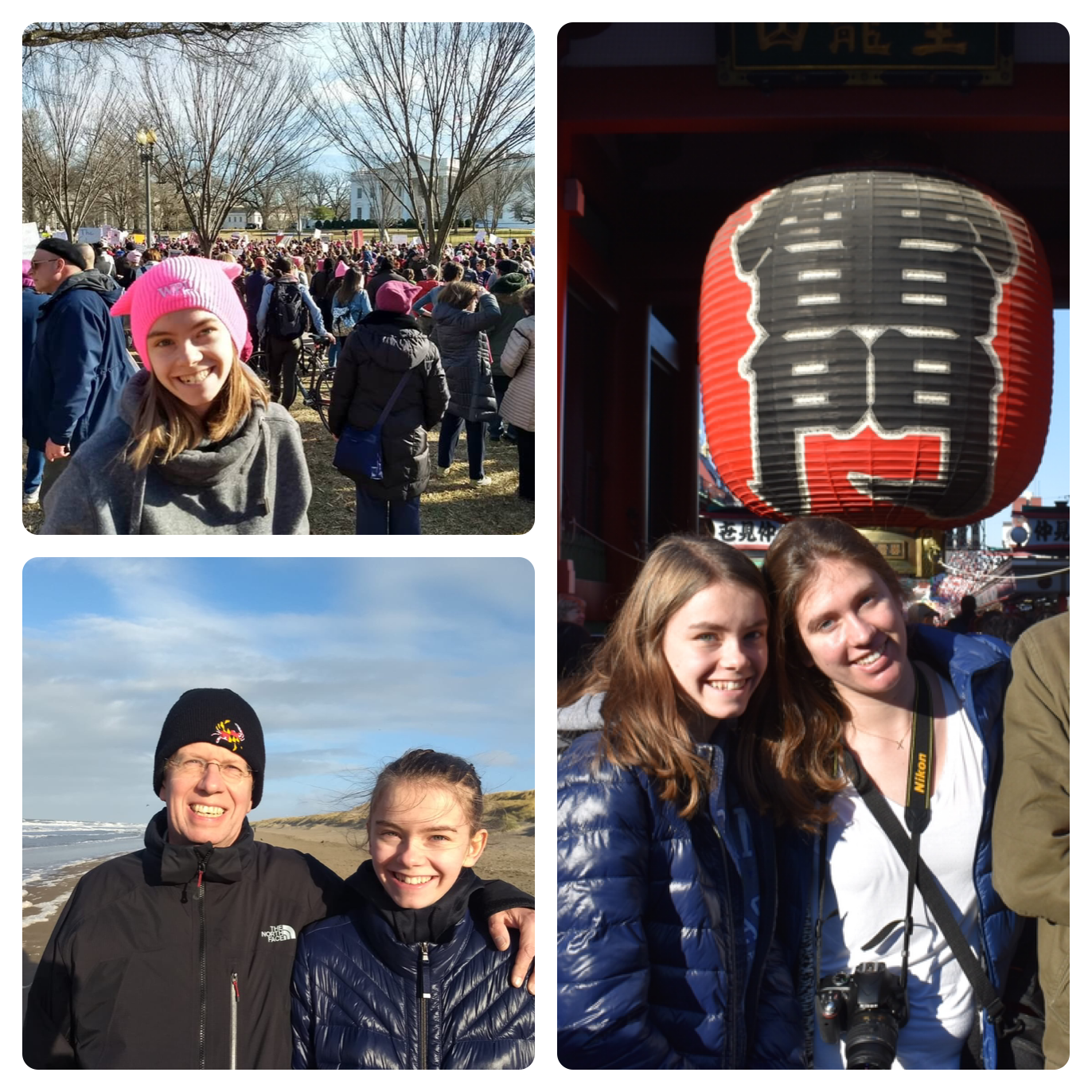
Upon moving to America, she promised herself that she would try to be more involved in school events. While it took Zhu years to feel comfortable to join a club when she was back in China, she joined Whitman Tech almost immediately when she started school freshmen year. The confidence she built up from traveling was a shock to her, she said.
“Moving to a new country is like a new beginning because you can use this as an opportunity to change yourself,” Zhu said. “It’s interesting to learn about different parts of the world.”
Former Whitman student Saskia Van Rossum lived in the Netherlands until she was six and then moved to Japan until sixth grade. From sixth to tenth grade, Van Rossum lived in Bethesda. Last summer, Van Rossum moved back to the Netherlands.
Trends often vary from country to country and have helped to shape the quirky parts of Van Rossum’s personality. From her time in Japan, she knows how to hold a chopstick better than any of her classmates in the Netherlands. Van Rossum also shoots film photography in the Netherlands: a passion she picked up from photography teacher Mike Seymour at Whitman. She’s in AP Photo now.
Van Rossum said she notices distinct differences in people from different cultural backgrounds. Each country and its people have influenced her personality and how she interacts with others, she said.
Constantly moving can also mean tough transitions. Van Rossum said that she constantly sees life back in Bethesda as she scrolls through social media posts from her friends and wishes she could be with them. Maintaining connections is a “double- edged sword,” she said; Van Rossum is still searching for a similar friend group in the Netherlands. She knows that she has friends to fall back on throughout the world, but she’s also conscious of how hard it is to hold onto them.
While Dragsted was in Nigeria, she didn’t have much time to make friends in the compound: families were constantly moving. A class of 20 one year looked completely different the next year, she said.
“Whatever friendships you formed, you knew in the back of your head that you probably wouldn’t see them again,” Dragsted said. “It definitely influenced how we interacted with each other.”
Even though Van Rossum was born in the Netherlands, she said at first she felt frustrated moving back. It was difficult to understand why she was moving away from the community and connections she had made in Bethesda to a country where the only thing that connected her was the language.
However, after a trip to Japan eight years after leaving, she said she realized that every country was her home because she’s developed as a person in each country.
When she came back to the Netherlands, she started to see the bright side of moving there: strengthening her Dutch, connecting with family and taking trips throughout this new country.
Dragsted thinks that the best way to explore a new culture is to constantly be curious and to find and embrace things that are different from what one is used to, she said.
“One thing I’ve learned from all the moving is getting to know new people and being interested in other people’s stories,” Dragsted said. “Even though it can be hard, it’s an important life skill that you learn.”
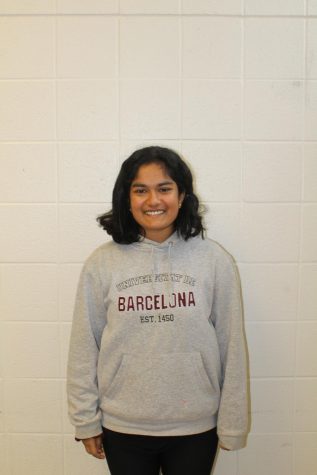
12
Why did you join the Black and White?
I wanted to see my name in the byline. Also, I wanted to get the scoop on school news before everyone else.
What's your favorite scent?
Churros!



